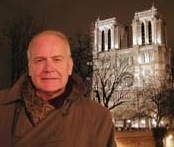She seduced me when I was twenty. Half a century later, I’m still her head-over-heels love-addict. Over the centuries, Paris has snared countless lovers, but she always seems to have room for one or two more. To love Paris is to share her with thousands of rivals: Don’t get involved with her unless you agree a little jealousy adds piquancy to passion.
Like every admirer, I yearned to shout my joy, my rooftop being a computer keyboard. Agape at the shelves of books about Paris, I wondered how to say anything new. Every cliché, proverb and story, every tree, fountain, museum, monument, park, square, alley, bar andrestaurant claims fans worldwide. But Paris is everybody’s private garden. To each Paris-lover, the city is a cherished secret. And as writers from Thomas Paine to Gertrude Stein, from Sigmund Freud to Pablo Neruda and Ernest Hemingway, have admitted, Paris easily becomes a second homeland. Even occasional visitors feel they own a unique Paris to which they’ll always return. They learn there’s Paris -- then the rest of the world.
Here you feel a citizen of the world, even more so than in other fabled capitals. For Paris seduces not by money or power, but by culture, history, respect for individuality, and an unfailing faith in romance. The French do their PR brilliantly: “French chic” and “French lovers” make an enviable (and exploitable) reputation. And on top of these gallant myths the French all pass for inspired cooks. This book doesn’t strive hard to dismiss any of that. There’s a little bit of truth in the legends, and besides, it’s fun to believe.
Unlike some foreigners who profess that they “love France but can’t stand the French,” I suffer the great weakness of loving France and liking the French – indeed, a sure sign of infatuation? – right down to their egregious faults. The seventy-two mini-essays here convey anything but uncritical praise or blind sentimentality. Some are caustic, even borderline vicious, about certain aspects of French society and customs.
That’s usually because these shortcomings illustrate some grand national illusion or (as I see it when impatient) hypocrisy -- and every nation has its own versions of both. With regret, I’m hard on certain French faults -- because I think they keep France from achieving its extraordinary potential as an intelligent, creative and humane nation. Making no excuses, I take refuge in the saying Qui aime bien, châtie bien – translatable, tongue in cheek, as in the old song, You Only Hurt the One You Love.
To advertise “Paris passions” is to betray a passion for all France, as well as for the French people. French customs, culture, reflexes, politics, aspirations – all claim space here. For Paris is not ‘just’ Paris; it’s the capital, and in every sense heart, of France. (Well, Lyon claims it’s France’s apostolic and gastronomic capital.). Paris has been my observation post not only for Paris as a city, but inevitably for everything French.
This book is not a museum-by-museum Paris travel guide. It’s a personal, highly idiosyncratic, survey of French people and institutions – of ‘curiosities’ that I hope may help you understand how the French think, feel, and look at the world. Drawing on fifteen years of living in Paris -- “watching” from a metaphorical sidewalk café -- I touch on wildly different topics. Their common thread: I found them all interesting. In some way fascinating, troubling, absurd, inspiring, infuriating, touching, or hilarious. Or just – hence our subtitle – bizarre.
I group the vignettes here by broad category, and link them with brief words of introduction and context. In most, I recall how history plays a huge and unavoidable role. For in France it is everywhere. To understand almost anything here, you need to look for its roots, often centuries-old. In these unpredictable, sometimes quirky, subjects, I’ve tried to identify whatever helps reveal French character and dreams. And the enchantment that is Paris.
The first eight chapters tend to look at longstanding realities of Paris and France. The last six, while still anchored in the past, weave in many of the startling changes now underway in French society and politics. In both cases, I try to pace reading by deliberately leaping from serious to satirical, from philosophy to frivolity, from hard-core analysis to softer glances at Parisian life.
Whether you’re visiting Paris or just dreaming about it, I hope this book can give you something of a long-term resident’s feel for Paris and France. Naturally, it looks up-close at Paris itself. But it moves on to intriguing French people and French activities – whether within France or in Europe, indeed farther afield.
Confession: I remain a dyed-in-the wool Anglo, Canadian-style. I am, as we Canucks are, a diffident, undemonstrative patriot of the Great White North. We are decaffeinated Americans – or Europeans in a hurry. No flag-waving or hand on heart for us. We are just quietly wild about our own gigantic Invisible Country – one of the world’s most complex yet unknown societies.
France, of course, is anything but quiet, diffident, decaffeinated and undemonstrative. It refuses on principle to be boring. It’s delighted to be thought crazy, as long as by that you mean brilliant, original, infinitely creative, and look-at-me amusing. That’s why there will be room for your book about Paris too, plus countless others.
K.S.
Paris, November 2008
